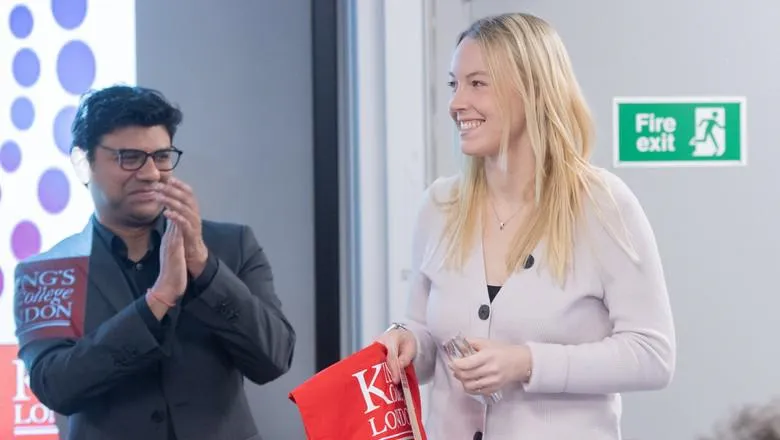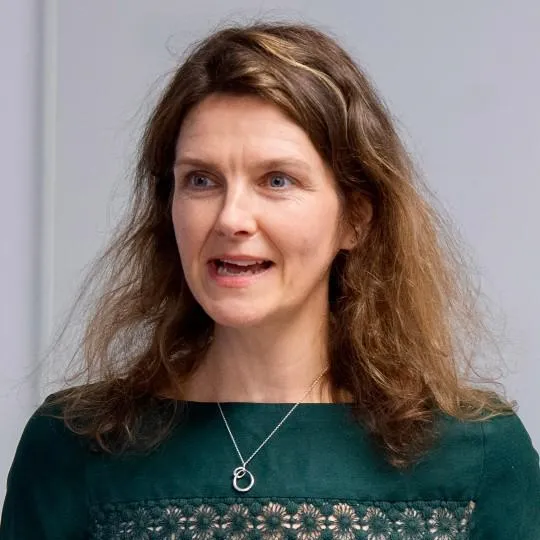Completing a Master’s can be life changing. Thanks to the support of WIPRO, we are creating a vibrant community of STEM educators who are developing the skills and confidence to explore relevant and urgent issues in their own education settings.
Dr Melissa Glackin, Director of the MA STEM Education programme
09 January 2025
Change your life with a scholarship to study STEM education
We are offering 13 scholarships covering 70% of the tuition fees to teachers working in state funded schools in England to study for a Master’s in STEM Education.

The global IT corporation WIPRO Limited has renewed its partnership with the School of Education, Communication & Society, for another three years. As part of this relationship, teachers based in England are invited to apply for one of 13 scholarships covering 70% of their tuition fees to complete an MA in STEM Education at King’s College London.
The MA in STEM Education provides a national, international and practically-oriented understanding of the ways in which core debates across formal and informal STEM education can shape responses to pressing social and environmental questions.
Students on the programme explore new ways to teach and engage people with STEM, as well as discussing the benefits of using innovative approaches to teaching climate change. By further developing their own STEM educational practice, they formulate and already apply practical responses to the question: What will STEM education look like in the future?
The WIPRO scholarship, opening up opportunities for teachers
For many of the teachers who have studied on this programme, the scholarship played a significant role in their initial decision-making to apply. While they wanted to think more deeply about their STEM education practice, they needed the financial support of the scholarships to be able to explore STEM education research and practice further.
Harry Gowlett, 2022 alumni, teaching full-time as a D&T teacher in Norwich, said: “When considering completing a Master’s course, I was concerned about how I would fund my studies, as there are very few funding opportunities currently available. The WIPRO scholarship significantly contributed to being able to complete the MA STEM Education course, without such an opportunity I would have seriously debated whether to complete the course or not.”
His classmate Rasha Jomaa, 2022 alumni, a full-time physics teacher in West London, said: “Being awarded the scholarship for the MA STEM Education allowed me to access an opportunity that may not have been achievable otherwise. Although the Master’s course is of great value, I may not have been able to cover the expense without the scholarship.”
An MA to approach STEM education in innovative ways
In addition to working with the lecturers to explore new ways of approaching STEM education and to learn from STEM education research, the students on the course have learned from one another. As they share their experiences of STEM education in and out of the classroom, they are able to reflect on different methods and approaches to STEM pedagogy, and apply and assess them as the course is unfolding.
Rasha went on to comment: “The course provided invaluable opportunities to meet other students from a rich and diverse background, who shared their opinions and own experiences related to STEM education."
Natalie Young, 2022 alumni, teaching full-time as a mathematics teacher, agreed: “As a result of the breadth and richness of inter-disciplinary conversations I had with fellow students on the course, I now work in a much more collaborative manner with other departments to deliver STEM education.”
Going further, Rasha shared the learning with her colleagues in her education setting. She said: “The course itself has had a great influence on many aspects of my career at multiple levels. As a teacher, I have shared research and my own assignments with the multi-academy trust that I work within, with the outlook that STEM can be shifted and formed to benefit our students.”
Rasha added that the course helped her learn how to focus on the learner’s experiences: “I also found that my research opened my eyes to student views and how they felt about the STEM education they received, which has influenced my own teaching practice and planning across my department.”
For Harry, the course has helped him build his confidence and experiment with a more interdisciplinary approach to STEM.
The MA in STEM Education course has inspired me to challenge my viewpoint of STEM. It has made me think more holistically about the purpose of STEM education and to champion change relating to STEM within my teaching role and more broadly within my educational setting. The course has given me confidence to introduce an interdisciplinary approach to STEM education which is greatly contributing to inspiring the next generation of STEM students.
Harry Gowlett, 2022 alumni of the MA in STEM Education programme
Towards more research-based STEM education
As part of the MA in STEM Education, students carry out original and varied research projects that add to the STEM education knowledge base and so inform practice and policy. They understand first-hand how much educational research has the potential to transform teaching, by guiding practice based on empirical evidence.
Eager to adopt the practices that will be most helpful in supporting their students learn and flourish, both Rasha and Natalie developed a strong interest in education research. Being able to see its application in the placements and internships they did was very useful, too, as was their chance to experiment in the School’s Maker Lab.
Rasha, who researched the extent to which climate change education prepares students in England’s education system for climate-related action, said: “The course lecturers spread an authentic sense of enthusiasm that has itself sparked a long-lasting interest in STEM education research, which I now hope to further pursue.”
Natalie shared Rasha’s newfound interest in education research, saying: “I found the course, in particular conducting my own research, an immensely rewarding and stimulating experience – so much so that it has motivated me to explore further opportunities for conducting research in education.”
Natalie did her thesis on ‘Critical values and critical pedagogy: Investigating how an A Level class experiences teaching statistics for social justice’. She was awarded the STEM Education WIPRO Dissertation Award 2022 for it.
The MA is run within the Centre for Research in Education in Science, Technology, Engineering and Mathematics (CRESTEM) at King’s. It is one of the largest, highly regarded research centres of its kind in the UK.
You can watch and hear students talk about the course as a whole below. The video was filmed before the COVID-19 pandemic.


